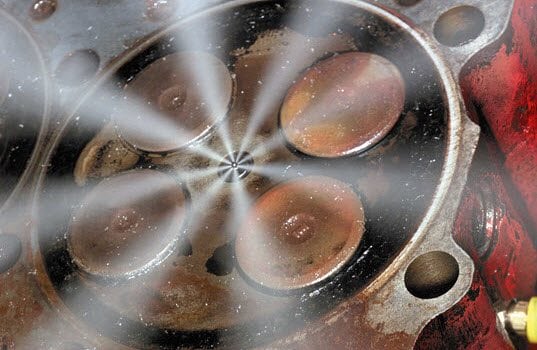By Everett Osgood and Kate Mansker, MidContinental Chemical Company, Inc.
As engine technologies have changed in order to meet fuel economy and emission reduction demands, it has become evident that ultra-low sulfur diesel (ULSD) may not be able to meet the requirements of some engines without some assistance.
In 2008, the Engine Manufacturer’s Association went public with concerns about ULSD creating deposits. Since that time, a major heavy duty diesel engine manufacturer and a major fuel injection equipment manufacturer have presented a joint position paper regarding the need for additives to enhance the performance of ASTM D975 diesel for use in today’s diesel engines. This article will touch on some of the additives pointed out by these organizations, as well as others that can deliver performance enhancements in today’s diesel fuel.
The winter of 2013-14 has been historic, so let’s start with winter operability which has been an issue for more parts of the country this year.
Low Temperature Operability
Diesel fuel has long been known for gelling and icing of filters in cold temperatures. A historic method of dealing with cold temperatures, and a method that some diesel owners still insist on, is the blending of No. 1 ULSD with No. 2 ULSD. This certainly lowers the temperature at which the fuel begins to gel, but it has a number of penalties at the same time. These penalties include lower BTU content which translates to reduced power, reduced fuel economy and increased fuel costs as the percentage of No.1 goes up. With less No.1 ULSD produced in the United States, availability is diminished and the differential in price between No.1 and No.2 ULSD makes this practice uncompetitive when compared to the low cost of cold flow improver additives.
Cold flow improvers in diesel fuel significantly lower the temperatures at which filter plugging occurs. Good cold flow additives not only modify the size and shape of the wax crystals in diesel so that large crystals do not form, but utilize a wax anti-settling agent to keep the wax crystals in suspension thus preventing wax fallout and accumulation. These additives can reduce the fuel cold filter plugging point (CFPP) by as much as 40°F and the pour point (PP) of the fuel by an even greater amount, but keep in mind that the performance of these chemistries is fuel specific and may vary from beginning of season to end of season based on changes that occur at point of refining and the fungible pool.
Detergents
High pressure common rail direct injectors are designed to operate with great precision multiple times, in some cases as many as six times, per combustion cycle. The timing has to be very precise and the tolerances are very tight. The injector tip openings are very small. Keeping them clean and working as designed is critical.
The age-old problem of carbonaceous deposits at diesel injector tips, commonly referred to as injector coking, still exists. In addition, we now have a problem with internal direct injector deposits, commonly referred to as IDID. These deposits are internal to the workings of high pressure common rail direct injectors. IDID are gummy, sticky deposits that can cause the internal workings of these injectors to stick open or closed or simply to throw off the precise timing and amount of fuel reaching the combustion chamber.
Detergents that were effective in the old industry standard test, Cummins L-10, were not cost effective in treating IDID, consequently new detergents have been developed to address IDID and have proven to be able to remove existing IDID and to keep IDID from forming.
The need for a detergent additive (at adequate levels) in diesel fuel has never been greater than it is today. The use of diesel detergent can keep injectors clean and operating as the engine manufacturer designed, which results in maintaining the fuel economy of the vehicle, more thorough combustion of the fuel, fewer emissions, reduced maintenance costs and more.
Lubricity
The severe hydro treating process used to produce our current ULSD reduces the lubricity of diesel fuel. Many of the fuel systems on diesel vehicles rely upon the fuel to lubricate its moving parts such as pumps and injectors. In order to keep moving parts in the fuel system from excessive wear and potentially premature failure, the fuel must provide lubricity. Most all diesel fuel will have a lubricity additive treatment prior to distribution to retail in order to meet ASTM D975, the specification for diesel fuel.
However, EMA and other groups recommend a more severe specification which requires increased levels of lubricity. This higher standard can be accomplished with supplemental treatment of lubricity in a performance enhancing diesel additive blend.
Corrosion Inhibitors
Water is an inherent problem in the fuel storage and transfer systems throughout the distribution, from refinery to end user’s vehicle tank. The supply chain participants work diligently to keep excess water out of the fuel via various means along the distribution chain before the fuel gets to the consumer, but it is highly probably that some water will remain. Consequently, an environment for ferrous metal corrosion exists and can be negated by the use of corrosion inhibitor in diesel fuel.
There are other types of corrosion that can occur with non-ferrous metals which can also be prevented or minimized with specialized corrosion inhibitors and should not be overlooked.
Antioxidants
Thermal and oxidative stability of diesel fuel and particularly biodiesel blends of diesel fuel are very important. Fuel decomposition can lead to filter plugging and shortened filter life, poor engine performance, injector deposit build up, and can even increase engine corrosion. Antioxidants, also commonly referred to as stabilizers, are added to diesel to prevent both oxidative and thermal decomposition which results in extended fuel storage life and can reduce vehicle maintenance costs.
With the increased use of biodiesel stabilizers have gained even more importance, but that’s a topic that requires discussion beyond the scope of this article.
Demulsifiers
As discussed above with corrosion inhibitors, water is an inherent problem throughout the fuel supply chain. With today’s high pressure common rail direct injection technology, equipment manufacturers have expressed a desire to have water dropped out of the fuel rather than pushed through these injectors. Demulsifiers will help separate the water from the fuel.
Cetane Number Improvers
Cetane number is a measure of the diesel’s delay in igniting when compressed. A higher cetane number indicates a fuel that has less ignition delay. Higher cetane number fuels not only ignite quicker, they more completely combust, resulting in reduced smoke and emissions. Cetane number improvers are commonly used in winter diesel additive packages to improve cold starting. The trend continues toward engine designs that require higher cetane number fuels. Because of this trend, it has become more common to include cetane number improvers in all-season diesel additives to enhance performance year-round.
As we started this discussion, an enhanced performance diesel additive package can contain one or more of the functional additives described above, or others based on the needs of your customers. From a fuel marketer’s perspective, offering an enhanced performance diesel product provides your customers with a fuel that helps them improve their performance and improve your margins.
 Everett Osgood ([email protected]) is the market manager for fuel additives at MidContinental Chemical Company, Inc. He has over 30 years work experience in the petroleum industry with a wide background of responsibilities in sales and marketing positions as well as, operations and project management.
Everett Osgood ([email protected]) is the market manager for fuel additives at MidContinental Chemical Company, Inc. He has over 30 years work experience in the petroleum industry with a wide background of responsibilities in sales and marketing positions as well as, operations and project management.
 Kate Mansker ([email protected]) is the technical manager for fuel additives at MidContinental Chemical Company, Inc. She has a degree in chemical engineering from the University of Missouri, Columbia. Her background includes industrial processing, energy management and over five years of experience in petroleum and automotive additives. MCC provides a full range of fuel additives, from gasoline additives to specialty products, such as static disipators. Its fuel additive programs can be delivered virtually anywhere in the United States and Canada. MCC offers both bulk and packaged (drums, totes and pails) delivery. http://www.mcchemical.com
Kate Mansker ([email protected]) is the technical manager for fuel additives at MidContinental Chemical Company, Inc. She has a degree in chemical engineering from the University of Missouri, Columbia. Her background includes industrial processing, energy management and over five years of experience in petroleum and automotive additives. MCC provides a full range of fuel additives, from gasoline additives to specialty products, such as static disipators. Its fuel additive programs can be delivered virtually anywhere in the United States and Canada. MCC offers both bulk and packaged (drums, totes and pails) delivery. http://www.mcchemical.com













